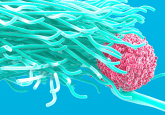Genetic mutation patterns revealed in kidney cancer
Research carried out at the McGill and Genome Quebec Innovation Centre in Montreal (Canada) has revealed the patterns of genetic architecture underpinning renal cancer, while also suggesting a possible link between the disease and aristolochic acid exposure. The results of the study were reported recently in Nature Communications.
Renal cancer is known to account for 2.4% of all adult cancers and more than 140,000 deaths each year. However, incidence rates have been rising steeply, with the highest rates occurring in Central Europe.
The study, conducted under the Cancer Genomics of the Kidney program (part of the International Cancer Genome Consortium), examined a cohort of 94 patients diagnosed with clear-cell renal cell carcinoma in the Czech Republic, Romania, Russia and the United Kingdom. Tumor and matched normal tissue samples were isolated from the patients and whole-genome sequencing on DNA isolated from blood and tumor tissue samples was performed, alongside RNA sequencing.
The findings of the study demonstrated a link between exposure to aristolochic acid and an increased incidence of clear-cell renal cell carcinoma, which was most notable in Romanian patients. While only 14 patients in the cohort were from Romania, the specific mutation pattern was found in 12 of them.
Yasser Riazalhosseini, assistant professor of genetics at McGill University, commented: “The most striking observation was the high frequency of a specific type of mutation pattern found in the Romanian patients. The specific sequence context surrounding these mutations and their predominance on the non-transcribed strand of DNA enabled us to hypothesize that the mutation is due to exposure to aristolochic acid during the patient’s lifetime.”
Aristolochic acid, commonly found in the Balkan Aristolochia clematitis plant, has been suggested to be the cause of a type of renal disease known as Balkan endemic nephropathy, which commonly affects Balkan people who live along tributaries and consume wheat flour contaminated with seeds of Aristolochia clematitis. The mutation pattern revealed in the cohort of study patients has also been exhibited in patients suffering from urinary tract cancer associated with Balkan endemic nephropathy.
Further findings in the study cohort were also demonstrated to correlate with renal cancer incidence. Most commonly, molecular aberrations in patients resulted in the deregulation of the PI3K/mTOR signaling pathway, as well as the disruption of the focal adhesion pathway connected to this pathway.
Riazalhosseini continued: “This finding adds to evidence that targeted therapies for PI3K/mTOR signaling may be applied effectively to kidney cancer, and may help patients affected by abnormalities of the focal adhesion pathway, as well.”
“This tumor genomic project is unique in that it is based on samples from various countries, with potential diversity in risk factors,” commented Ghislaine Scelo of the International Agency for Research on Cancer. “Our study illustrates that systematic exploration of tumor DNA via massive sequencing can identify previously unsuspected causes of cancer.”
Follow-up research is currently being conducted by the team at McGill University, in the hope of analyzing samples from more Romanian and Balkan patients to assess the extent of exposure to aristolochic acid.
In the meantime, the findings underscore the importance of investigating possible sources of exposure to aristolochic acid, as the compound is known to be consumed and used in herbal remedies in different areas of the world. Future research may lead to targeted therapies for renal cancer that act upon the identified genetic patterns and deregulated PI3K/mTOR pathway.
Source: McGill University press release




